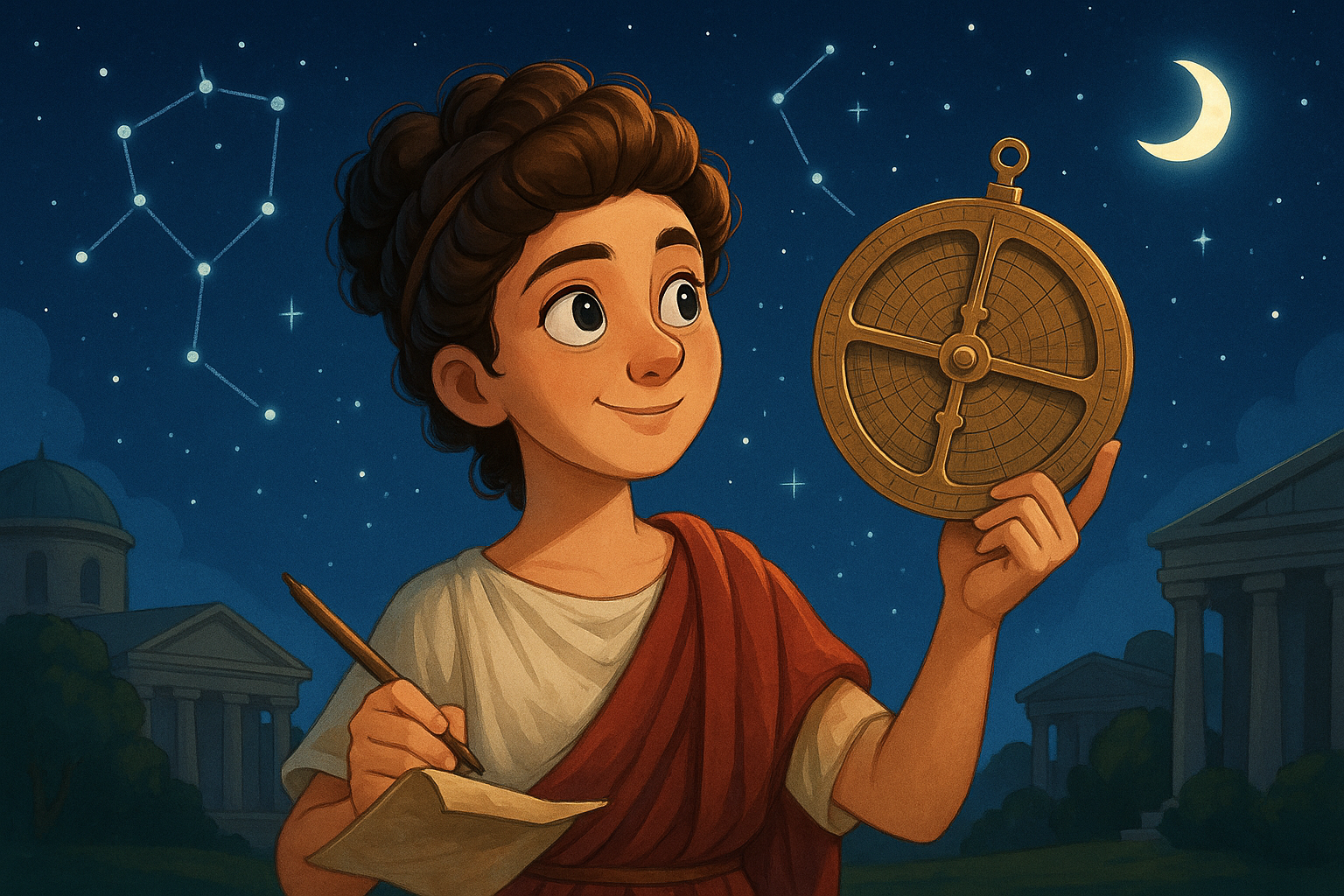
Excerpt
Introduction: Why Hypatia Still Matters
The streets of Alexandria were always full of sound—people shouting in the markets, sandals slapping against stone paths, the creak of carts being pulled by donkeys, and the hum of conversations in Greek, Latin, Egyptian, and more. It was a city where ideas moved almost as fast as gossip. Inside its great library, the largest in the ancient world, scrolls held secrets from every part of the known earth.
And in the middle of all that noise and motion lived someone completely unexpected: Hypatia.
People had heard of her before they ever saw her. She wasn’t known for starting arguments or running shops. She was known for asking big questions—about stars, numbers, life, and truth. And not just asking, but answering them.
You might be thinking: lots of people are smart, right? That’s true. But not everyone lives in a time when they’re allowed to show it. Back then, most people thought women should stay quiet about complicated things like math or science. That didn’t stop Hypatia. In fact, it didn’t even slow her down.
She walked through Alexandria wearing long robes, not the fancy clothes other women wore to parties. Her robe wasn’t for style—it showed she was a philosopher, someone who searched for knowledge. It made people stop and stare. Some looked confused. Some were annoyed. But many were curious. Who was this woman who acted like a teacher in a world of men?
Hypatia didn’t care if people whispered. She had things to study, ideas to chase. Her days were packed with scrolls, numbers, tools for measuring the stars, and quiet moments spent deep in thought. Her nights were often filled with questions she hadn’t yet solved.
But she didn’t just keep all that knowledge for herself. That’s one of the things that made her different. She believed wisdom was meant to be shared. Her students came from everywhere—some rich, some poor, some from faraway places. They didn’t come because she made things easy. They came because she made things clear.
She spoke in ways that made even the hardest topics feel like puzzles you actually wanted to solve. She didn’t say, “Here’s the answer.” Instead, she asked, “Why do you think that’s true?” Her students had to think for themselves. At first, that frustrated them. But soon, they loved it. They started to see the world differently—not just as it was, but as it could be understood.
Hypatia also helped people learn how to argue. Not the loud, angry kind of arguing. The smart kind, where you listen carefully, ask questions, and explain your thoughts with respect. That’s a lot harder than yelling. It takes practice. But she taught her students to do just that. And guess what? Many of them became leaders, scientists, and thinkers because of it.
It wasn’t just about numbers or planets. Hypatia taught her students how to think deeply, how to stay calm when others got angry, and how to speak when others stayed silent. She taught them that truth wasn’t something you grabbed once and kept forever. It was something you worked toward—again and again—with logic, reason, and kindness.
In a world where people were quick to take sides, Hypatia stood in the middle. Not because she didn’t care, but because she believed wisdom came from listening to everyone. She talked to people from different religions, different schools of thought, even different countries. Some people didn’t like that. They thought it made her too open. Too careful. Too fair.
But Hypatia didn’t want to win arguments. She wanted to understand. She wanted to bring people together—not by force, but by thinking hard and asking better questions.
That’s one reason many people thought of her as a guide. Not the kind that points at maps. The kind that helps your brain light up.
Even adults—important ones!—came to her for advice. Some were government officials, some were priests, and some were just curious visitors who had heard stories. They sat on stone benches, drinking in her words like water on a hot day. And she never showed off. Her voice was calm. Her face serious. She wasn’t trying to be famous. She was trying to be true.
She showed people that big thoughts didn’t have to be scary. They could be exciting. Even beautiful.
Not everyone liked that. In fact, some people thought it was dangerous. When someone questions the way things have always been, it can make others uncomfortable. Some people thought her ideas were too bold. They worried that if too many people listened to Hypatia, they might start asking their own questions—about power, about fairness, about the universe.
And they were right. That did happen. People did start asking more questions. But that’s not something to fear. That’s something to celebrate.
The truth is, Hypatia didn’t fit into the box the world had made for her. But instead of shrinking to fit, she built a bigger box. And then she invited others in.
She wasn’t magical. She didn’t have special powers. She just believed that anyone, even a girl in a world of men, could chase the truth and share it with others.
The streets of Alexandria were always full of sound—people shouting in the markets, sandals slapping against stone paths, the creak of carts being pulled by donkeys, and the hum of conversations in Greek, Latin, Egyptian, and more. It was a city where ideas moved almost as fast as gossip. Inside its great library, the largest in the ancient world, scrolls held secrets from every part of the known earth.
And in the middle of all that noise and motion lived someone completely unexpected: Hypatia.
People had heard of her before they ever saw her. She wasn’t known for starting arguments or running shops. She was known for asking big questions—about stars, numbers, life, and truth. And not just asking, but answering them.
You might be thinking: lots of people are smart, right? That’s true. But not everyone lives in a time when they’re allowed to show it. Back then, most people thought women should stay quiet about complicated things like math or science. That didn’t stop Hypatia. In fact, it didn’t even slow her down.
She walked through Alexandria wearing long robes, not the fancy clothes other women wore to parties. Her robe wasn’t for style—it showed she was a philosopher, someone who searched for knowledge. It made people stop and stare. Some looked confused. Some were annoyed. But many were curious. Who was this woman who acted like a teacher in a world of men?
Hypatia didn’t care if people whispered. She had things to study, ideas to chase. Her days were packed with scrolls, numbers, tools for measuring the stars, and quiet moments spent deep in thought. Her nights were often filled with questions she hadn’t yet solved.
But she didn’t just keep all that knowledge for herself. That’s one of the things that made her different. She believed wisdom was meant to be shared. Her students came from everywhere—some rich, some poor, some from faraway places. They didn’t come because she made things easy. They came because she made things clear.
She spoke in ways that made even the hardest topics feel like puzzles you actually wanted to solve. She didn’t say, “Here’s the answer.” Instead, she asked, “Why do you think that’s true?” Her students had to think for themselves. At first, that frustrated them. But soon, they loved it. They started to see the world differently—not just as it was, but as it could be understood.
Hypatia also helped people learn how to argue. Not the loud, angry kind of arguing. The smart kind, where you listen carefully, ask questions, and explain your thoughts with respect. That’s a lot harder than yelling. It takes practice. But she taught her students to do just that. And guess what? Many of them became leaders, scientists, and thinkers because of it.
It wasn’t just about numbers or planets. Hypatia taught her students how to think deeply, how to stay calm when others got angry, and how to speak when others stayed silent. She taught them that truth wasn’t something you grabbed once and kept forever. It was something you worked toward—again and again—with logic, reason, and kindness.
In a world where people were quick to take sides, Hypatia stood in the middle. Not because she didn’t care, but because she believed wisdom came from listening to everyone. She talked to people from different religions, different schools of thought, even different countries. Some people didn’t like that. They thought it made her too open. Too careful. Too fair.
But Hypatia didn’t want to win arguments. She wanted to understand. She wanted to bring people together—not by force, but by thinking hard and asking better questions.
That’s one reason many people thought of her as a guide. Not the kind that points at maps. The kind that helps your brain light up.
Even adults—important ones!—came to her for advice. Some were government officials, some were priests, and some were just curious visitors who had heard stories. They sat on stone benches, drinking in her words like water on a hot day. And she never showed off. Her voice was calm. Her face serious. She wasn’t trying to be famous. She was trying to be true.
She showed people that big thoughts didn’t have to be scary. They could be exciting. Even beautiful.
Not everyone liked that. In fact, some people thought it was dangerous. When someone questions the way things have always been, it can make others uncomfortable. Some people thought her ideas were too bold. They worried that if too many people listened to Hypatia, they might start asking their own questions—about power, about fairness, about the universe.
And they were right. That did happen. People did start asking more questions. But that’s not something to fear. That’s something to celebrate.
The truth is, Hypatia didn’t fit into the box the world had made for her. But instead of shrinking to fit, she built a bigger box. And then she invited others in.
She wasn’t magical. She didn’t have special powers. She just believed that anyone, even a girl in a world of men, could chase the truth and share it with others.




